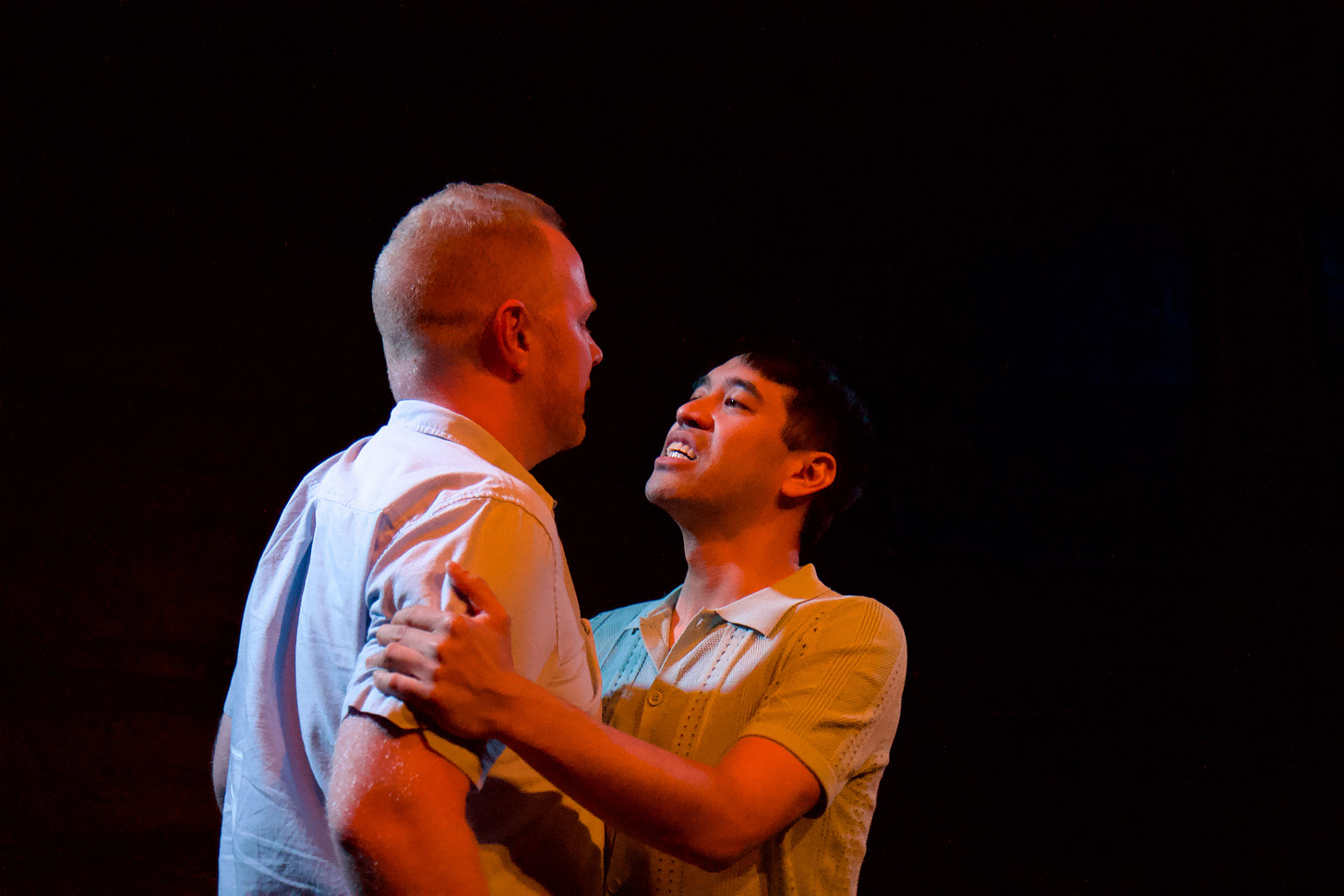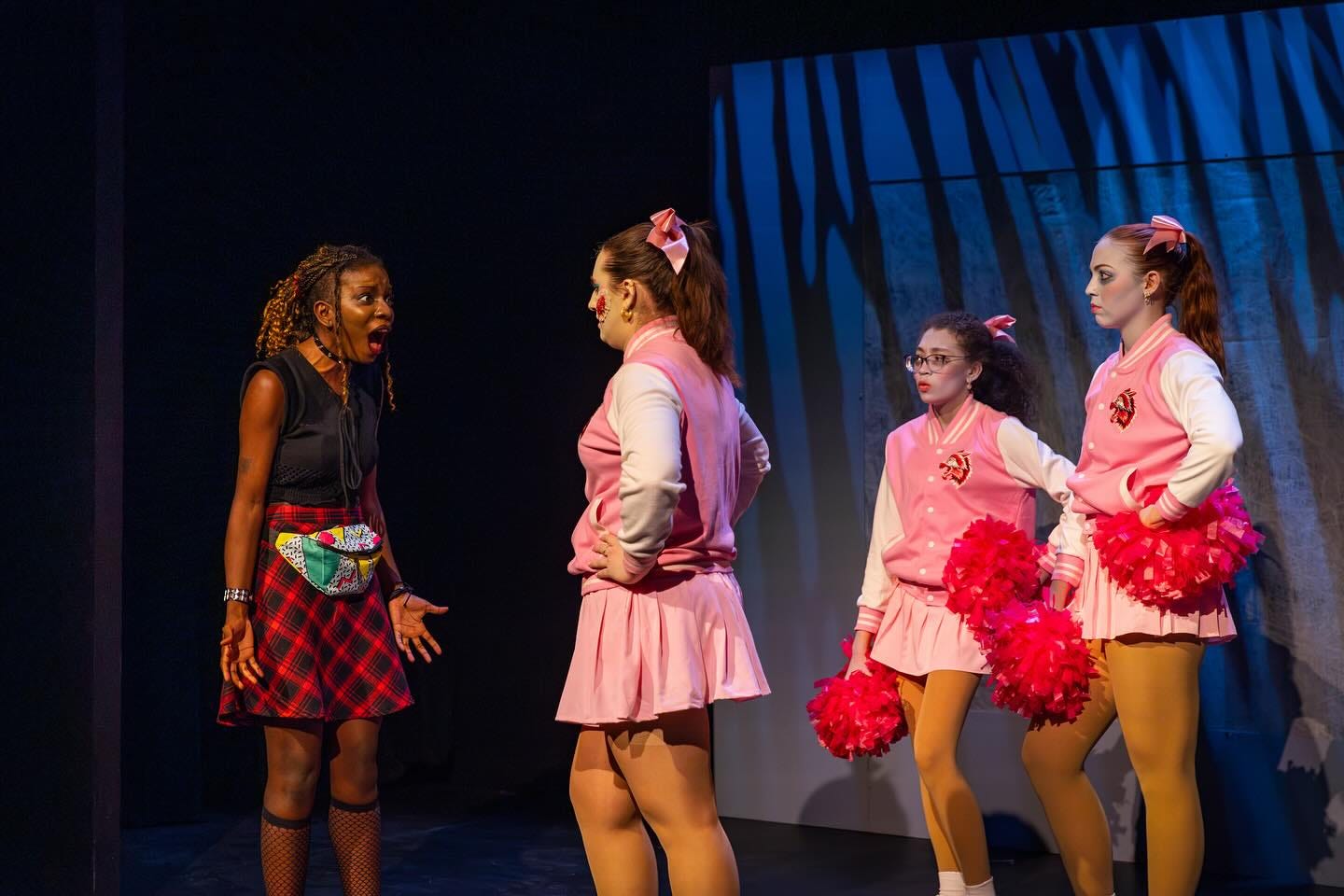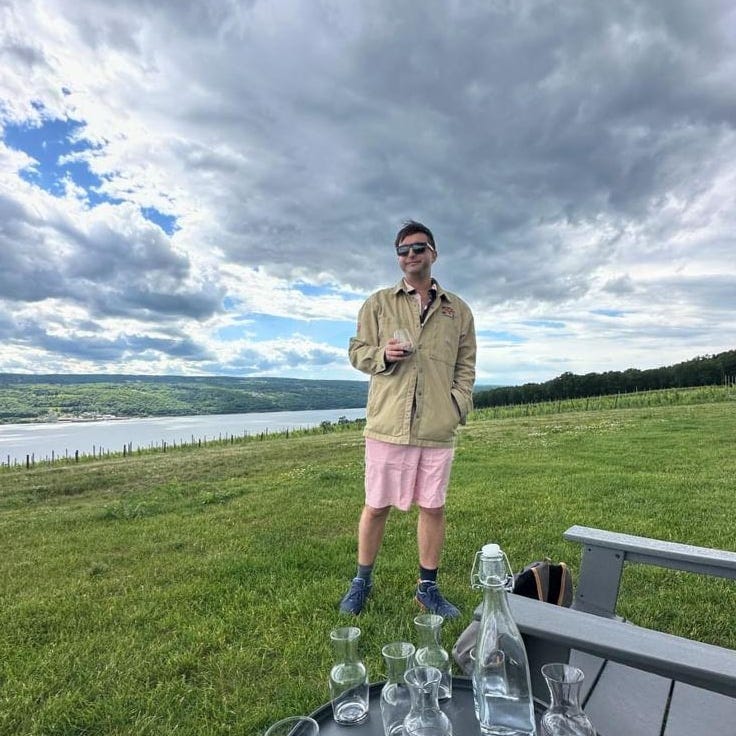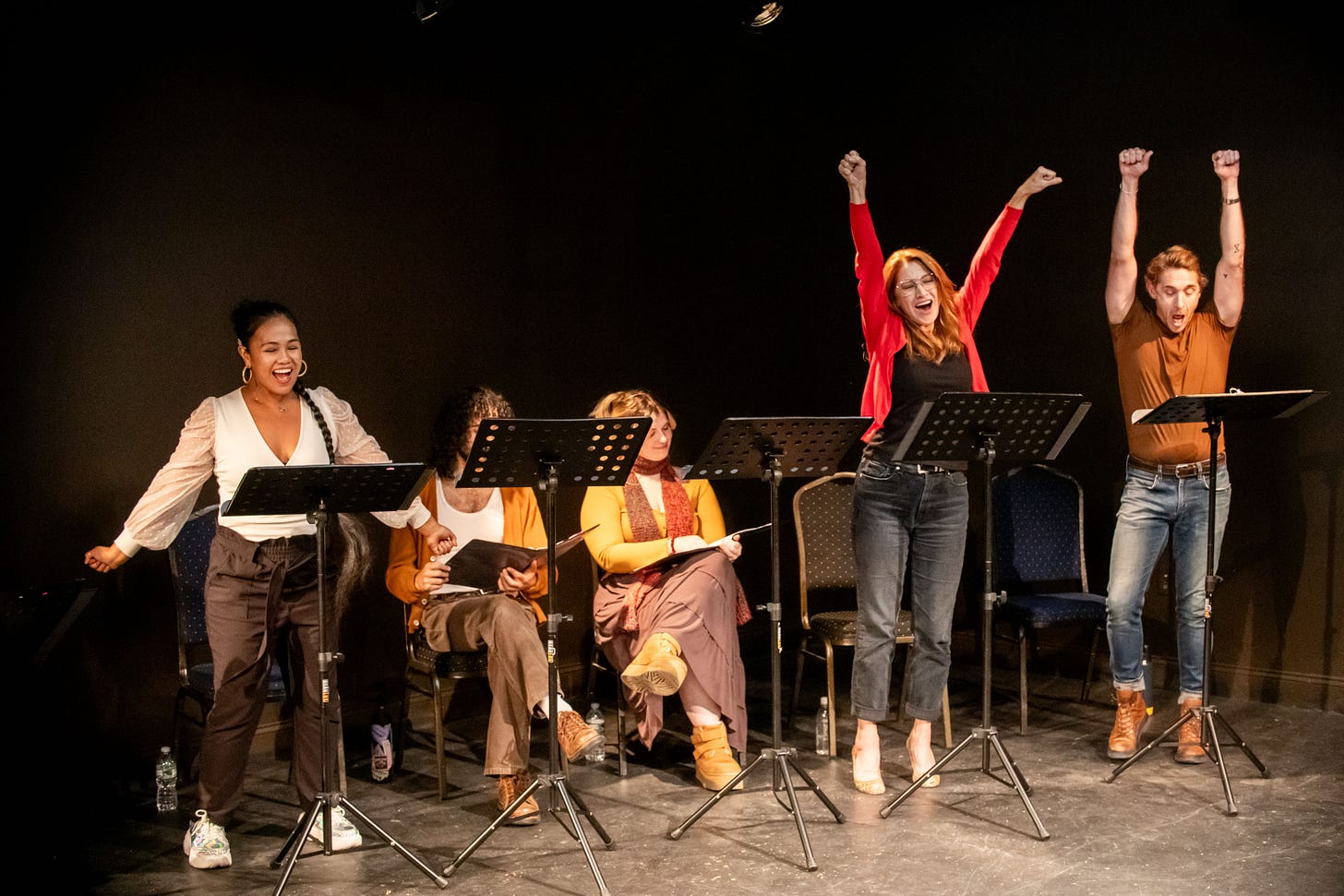▶️ Press Play: An Interview with playwright Brandon Monokian
"Finding who you are and how you operate best as a human is intertwined with who you are and how you operate best as a creator."
Welcome to The Long Pause, a newsletter about being creative, being stuck, and what to do about it. I’m Erinn. I’m a writer and an artist in a long, long Pause.
Today’s post is part of the Press Play interview series, which asks creative folks to share the story of their Long Pauses so we can see how trying to live up to some capitalist fantasy of creativity is oppressive bullshit. Today, playwright Brandon Monokian shares how his Long Pauses have led to creative transformations, and how knowing yourself as a human is critical to knowing yourself as a creator. 💖
Explain yourself. Who are you, how do you identify as an artist / creative?
My name is Brandon Monokian, and I’m a playwright!
You’re here because you’ve gone through a fallow period where you didn’t produce much work for an extended period. How did your Long Pause come about? How long did it last? OR are you still in it?
I’ve gone through many iterations of pauses where I couldn’t make work and nothing was happening for me at all. I’m in an interesting version of a long pause at the moment where I’m having one of my most successful years in terms of the amount of public showings my work is having, but I haven’t written anything new in probably over nine months. This is after a really fertile creative period in which I wrote 10 full-length scripts in two years. And these last nine months I’ve maybe written a few paragraphs, and done some minor tweaks to scripts, but my creative flow and creative practice has unfortunately been all but paused.
I think a big part of this is I have a lot of responsibilities for the current productions of my work outside of writing. I knew this would be the case going into them, so I want to be clear: I’m not complaining about having to take on these tasks, but I do hope one day I’ll be in the position to just focus on the writing. And in fact, the reason why I took these projects on is with the hope they would be seen by people who are better at producing than I am and perhaps they would want to collaborate with me, them focused on the producing elements and me strictly focusing on the writing.
My path to writing came out of different kinds of pauses. I first wanted to be an actor and then I wasn’t getting cast as much as I wanted, so I started directing and producing work, and then I wasn’t finding the kind of plays to direct that were right for the actors I wanted to work with so I started writing things for those actors to perform and I’ve been writing fairly non-stop ever since, with this being the longest time that I’ve gone without writing something new since I’ve started writing. I’m curious if at the end of this pause I’ll end up doing something new.

Did you engage with other creative practices while you were blocked from your primary mode of expression during a Long Pause?
I recently baked bread for the first time and it gave me the kind of rush doing really creative work gave me. One thing I’ve re-learned during this pause is just how important experiencing things outside of creative work is to the act of creativity. I feel like I knew this at some point but as I look back over the last few years I can see that I haven’t been doing things to fill my creative well like I was when I was younger. When I baked that bread, cut into it, and took my first bite, it gave me a whole new vocabulary of sensation that I know I can bring to my writing if and when I go back to it.
Has anyone provided a model for you in terms of the ebbs and flows of a creative life? I’m interested in how your sense of identity as a creative was shaped, how (or if) making work consistently fit into it, and how that may have shifted in response to a Long Pause.
I really love seeing the theatre pieces Frances Ruffelle creates. She has had some major mainstream success (she won the Tony for Les Mis by creating the iconic role of Eponine plus has done many other major things like Eurovision!) but what inspires me the most about her are the solo shows she has created. The way she ties together poetry and music, and the way she claims a space with her voice and her presence and makes you feel like you are in a whole other universe no matter what venue she is in is something I aspire to. She talks a lot about not only writing every day but about an absolute love of creating. I think sometimes we can think of the creative life in negative ways, but her absolute love of the act of creation has been one of the most inspiring things for me as I form my own creative practice.
What advice would you give another creative about how to move through a Long Pause?
I think Kelly Cutrone said it best:
“sometimes in life seasons don’t come in order; instead of fall, winter, spring, summer, we get three winters in a row. But that doesn’t mean spring won’t come eventually.”
What have you read / watched / seen that has been helpful for you and your creativity? Any books, art, or media to recommend?
I recently read The Way of the Wild Goose by Beebe Bahrami which is a travel memoir of three different pilgrimages she took on the Camino de Santiago, which is a 500-mile walk across Spain and France. The way Beebe talks about creativity and seeing how her lived experiences informed her creativity was super inspiring. She also talks about claiming a confident identity as an artist and the way she spoke about that gave me a newfound sense of my own self. Plus the descriptions of wine and food throughout the book are heavenly.

There’s a lot of rhetoric around “putting in the work” or “being productive” when it comes to creative output that can be helpful in some contexts (think: tracking your progress so you can see small actions add up!), but very unhelpful in this one. What would you say to someone who thinks you can just “snap out of” or “power through” a pause like the ones you’ve experienced?
I do think these things can be helpful at times, but we need to learn to be clear with ourselves about where we are in our creative life. Sometimes we need a break and that’s okay. Take the break. The page will always be there for you to fill with words when you’re ready to do so. And sometimes we feel the need to create but we let our fear of failure stop us from putting in the work, and in those cases I think we need to put ourselves in positions that help us snap out of it. If I’m in that kind of place I’ll sign up for a class or I’ll submit to something that will force me to write because I’ll have a deadline. That’s helpful for me, but it may not work for everyone. Creativity isn’t some one size fits all. Maybe some things I’ve said or some quotes I’ve shared in this interview will speak to people and if they do, then take them and use them. But maybe they won’t, which is okay, because ultimately we need to find what works best of us as creative individuals. Finding who you are and how you operate best as a human is intertwined with who you are and how you operate best as a creator.
Brandon Monokian is an American playwright. Plays include amethyst. (written as an Artist in Residence for EveryLibrary), Let's Summon a Demon at Debbie's, Echo & Narcissus Blast Third Eye Blind Outside a Diner in New Jersey at 2am, Free Baby Parakeets and Zombie Cheerleaders, a Teenage Witch & The Demonic Voice on the Other End of the Phone. He has spent time workshopping plays at the Sewanee Writers Conference, Valdez Theater Conference, Luna Stage’s New Moon series and The Tank. He wrote and appeared in the feature length film Happy Yummy Chicken. His creative work is dedicated to Suzzanne Douglas.
You can find Brandon on Instagram at @brandonmonokian
Upcoming performances:
October 24 - 28: Let’s Summon a Demon at Debbie’s at the Twin Cities Horror Festival. Tickets here.
October 29 - 30: Let’s Summon a Demon at Debbie’s at Plays & Players in Philadelphia. Tickets here.





Another great interview! One of the things that stood out in my mind was realizing that we’re always being creative, even when we’re not actively producing something on paper or canvas. It’s like creativity lives in the moments we let ourselves breathe and observe, even if those pauses don’t look ‘productive’ on the surface. I appreciate the reminder that each of us has our own rhythm, and finding what works for us as individuals is essential to embracing that creative flow.